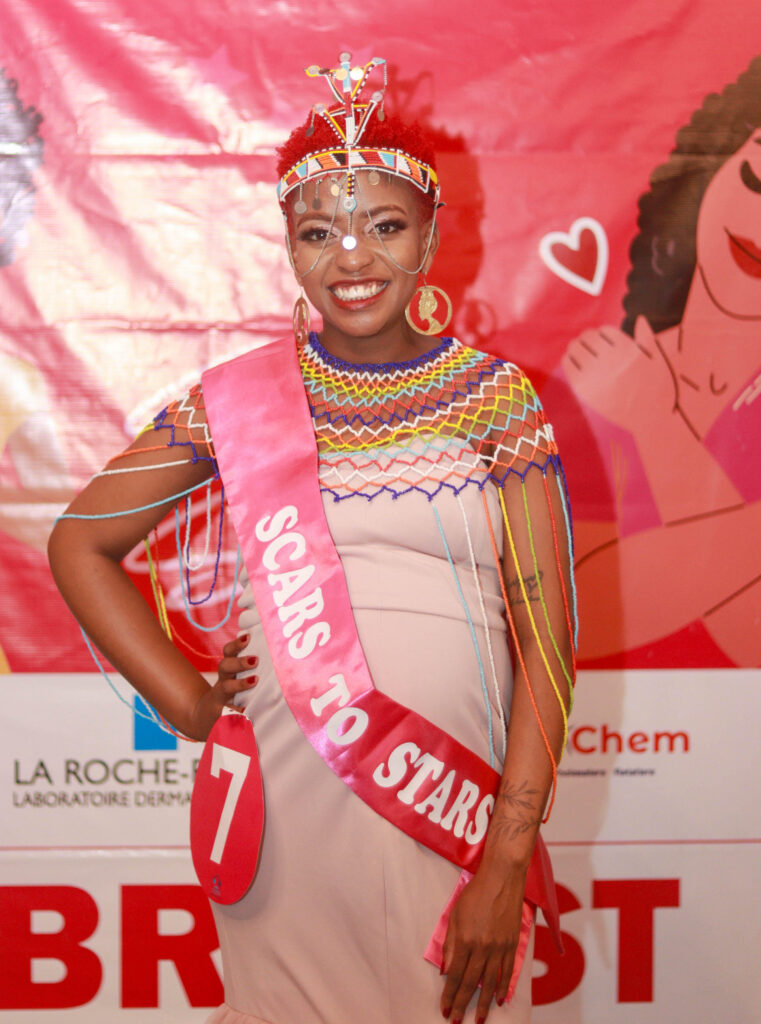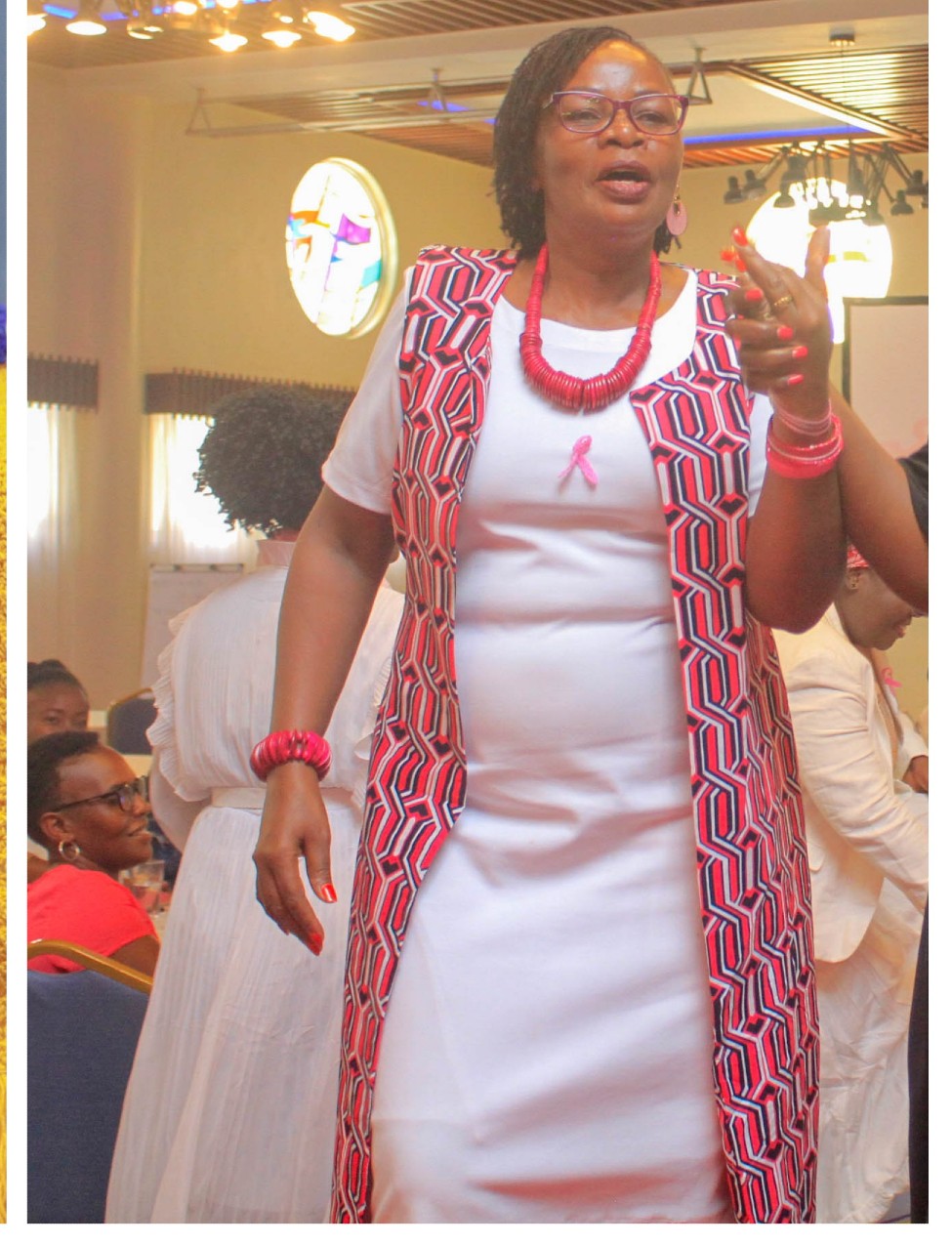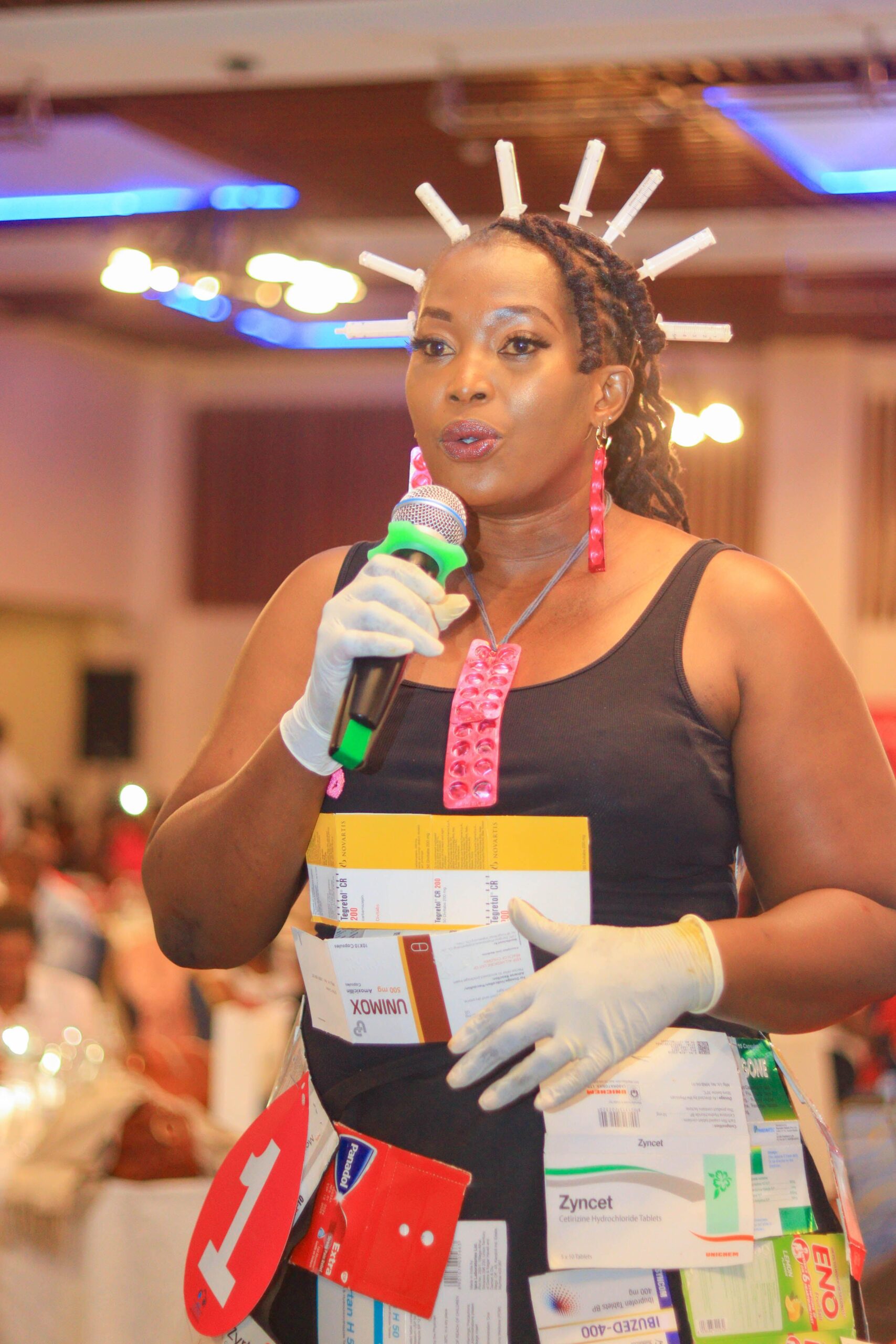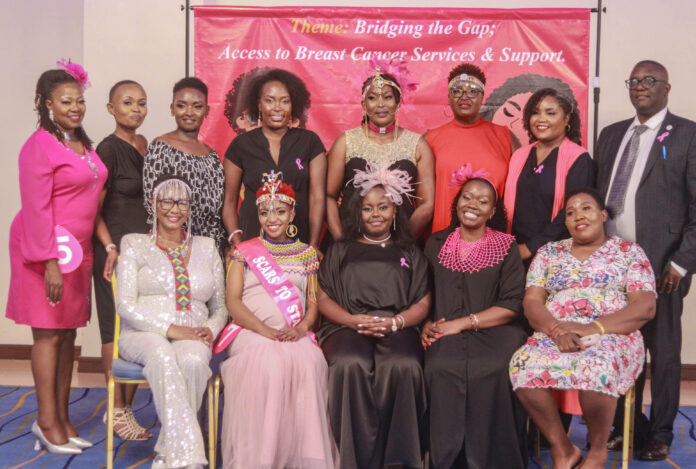By Melisa Mong’ina
From scars to stars, the journey of breast cancer survivors is one of courage, resilience, and transformation. Yet, in many communities, cancer remains a taboo, and those affected are often seen as a burden or even a disgrace, adding to the heavy weight they already bear. But despite the stigma, these survivors rose above, turning their pain into purpose and becoming beacons of hope to others.
In honor of Breast Cancer Awareness, we celebrate these remarkable individuals, sharing their stories of strength, the fight to break down social barriers, and their mission to shine brighter for those who may feel lost in the shadows.
Cancer Data indicates that breast cancer has the highest incidence amongst all cancers, with over 2.2 million cases reported globally in 2020. In Kenya, it is the leading type of cancer with 6,799 new cases in 2020.
Mwende Mutiso
Mwende Mutiso, a 31 year old breast cancer survivor, shares her journey with Talk Africa. She recounts receiving her first stage zero breast cancer diagnosis at the age of 23, leading to one of her breasts being removed. In 2019, she got a recurrence that spread to one of her lungs, and another recurrence in 2023. Each recurrence made her journey tough and emotional.
“I am a breast cancer survivor and this marks my ninth year since I was first diagnosed,” shared Mutiso. “I was first diagnosed at 23 years with stage zero breast cancer. Then I experienced a recurrence in 2019. The cancer had spread to one of my lungs. I also faced another recurrence last year in 2023. The journey has been a roller coaster of emotions, and it has been incredibly tough.”
Mwende adds that her cancer journey was not an easy one since she struggled with low self-esteem due to the fact that her family had no history of cancer and being the youngest in the family, it was hard for her to accept the diagnosis. She also recounts facing stigma and blame games from others.

“I was struggling with low self-esteem, and generally my emotional well-being was not okay,” Mwende shared. “We have no history of cancer in our family, and as the youngest, it was quite hard to accept the news of my diagnosis. There’s often a lot of stigma surrounding cancer. People start blame games of either you are not eating well, not exercising, or you are cursed.”
She shares that although her journey has been difficult from a financial, emotional and physical aspect, she has been able to experience many small miracles along the way. One of the most unexpected blessings is being pregnant with her first child and both of them being in good health, something which she never expected due to her diagnosis.
“I have lived with stage-four breast cancer since 2019, and It has not been an easy journey from the financial, emotional, to the physical aspect. But at the same time I have also seen a million little miracles along the way, which is the fact that I’m expecting my first baby right now. I am currently eight months pregnant and both the baby and I are doing really well, something which I never thought was possible due to my diagnosis,” explained Mwende.
Mary Mwangi
Mary Mwangi, a 53 year old mother of three adults and a wife, is also a cancer survivor with a challenging journey. She recounts her cancer journey beginning in 2016 when she felt a sudden shock on her right side while preparing breakfast for her family. At the hospital, she was misdiagnosed with spine TB, which led to her legs becoming weak. She then decided to change doctors and was eventually diagnosed with spine cancer stage 3b. Mary underwent 33 rounds of radiotherapy and chemotherapy for two years.
“My journey began in 2016, on what seemed like an ordinary day. I was preparing breakfast and as I bent down to set the table, I suddenly could not stand back up. A shock ran through my entire right side,” recounts Mary. “At the hospital, I was diagnosed with spine TB, which was not the case and I underwent treatment for 11 months, but it was not working and my condition was worsening. My legs grew so weak that I couldn’t walk. So during the 11th month of my TB treatment, I decided to change the doctor, and started seeing an oncologist. That’s when I was finally diagnosed with stage 3b spinal cancer. I underwent 33 rounds of radiotherapy and two years of chemotherapy.”
Before completing her radiotherapy for spinal cancer, Mary discovered a lump in her left breast while taking her shower. At the hospital, she was again diagnosed with stage three breast cancer. Mary then underwent 20 sessions of radiotherapy and for two years of chemotherapy, eventually being declared cancer free in 2020.
“One morning, as I was preparing for my radiotherapy session, I felt a lump in my left breast while taking a shower. The doctor advised that we first complete treatment for my spine cancer before addressing breast cancer. I was later diagnosed with stage three breast cancer, and I underwent 20 rounds of radiotherapy, and continued with chemotherapy for two years. Finally, in 2020, I was declared cancer free,” shared Mary.

Mary discussed the challenges she faced, including stigma, isolation, and rejection, which often led to mental health struggles. She emphasized the importance of maintaining a positive mindset and shared how her knitting work served as a form of therapy during treatment. Knitting helped her avoid conversations about her illness and provided a positive destruction.
“It was not an easy journey because there were many challenges in between, there was stigma, isolation, rejection, and most of the times, cancer patients lose relationships, which can lead to mental health issues. When I was diagnosed with spine cancer, I was put on bed rest for a year and two months, and I was only given 40 minutes a day to sit. I used that time to knit and it became a form of therapy. Visitors wouldn’t talk about my illness; instead, they would focus on my knitting, because I proudly displayed my work. This enabled me to stay determined to heal and maintain a positive mindset,” She shared.
She made 200 chemo hats, which she donated to the children’s ward at Kenyatta Hospital, and later received encouragement to sell the rest. These sales helped her revive her business, which she had closed due to treatment costs. By selling her knitted products, she was able to support herself financially.
“During that one year and two months, I knitted 200 chemo hats, which became a form of therapy for me. I used to donate the hats to the children’s ward at Kenyatta Hospital. While there, I met this lady who encouraged me to not only donate but to also sell them. She shared photos of my work on her social media, and two organizations became interested in buying from me. This helped me to revive my business, which I had closed due to my treatment,” added Mary.
Lydia Atieno
Additionally, Lydia Otieno, a mother of eleven children, with six of the children being adopted and five of them being her biological kids, narrates her initial reaction upon discovering a lump in her breast. She recalls her disbelief, thinking cancer was not for people like her since she appeared healthy. After the check up at Aga Khan Hospital, she was diagnosed with stage two breast cancer.
“I had lived a good life, never faced any health challenges, until I was diagnosed with cancer, last year in March. I had felt a lump in my left breast, but I assumed thinking cancer was not for people like me since I appeared healthy. As a wellness champion at my workplace, I always encouraged others to do self-tests and my time had come. I decided to go to the hospital for a checkup. My first visit was to Nairobi hospital, where they noted it was highly suspicious. I was then referred to Aga Khan hospital, where I was diagnosed with stage two breast cancer,” narrates Lydia.

She shares that she chose to face her situation with a lot of confidence. Thanks to her early diagnosis, her surgery was successful, and she was treated and recovered. The tumour in her left breast was removed, and the other reduced, allowing her to retain both breasts. For her, chemotherapy was her “worst nightmare”; the first session was tough but she found strength to continue fighting the disease because she had faith that she would get over it.
“My surgery was scheduled, and through it all, I just took everything as it came. The surgery was successfully done, and with early diagnosis, there’s treatment and a chance for healing. I was diagnosed with left breast cancer and the tumour was removed, and my other breast was reduced, so I was able to retain both of my breasts. Chemotherapy was my worst nightmare. The first session really put me down. But after that, I picked up and continued. I underwent six cycles of chemo and then went through 20 rounds of radiotherapy during my treatment,” shared Lydia.
Social Support System
Mwende Mutiso shares that her family was incredibly supportive throughout her cancer journey. Her siblings helped by taking her to the hospital, and her colleagues generously contributed towards her treatment .She highlighted the importance of having a support system, which helped her cope.
“During the first run of my cancer journey, I received a lot of support. My family was super supportive. I had siblings who took me to the hospital for my treatment, and colleagues who were willing to donate towards my medical expenses. I also found a great support system in cancer spaces like KENCO, where I met people who had been through similar experiences,” stated Mutiso.
She notes that during the second diagnosis support often fades over time, as people grow used to the situation, highlighting the challenges of maintaining friendships and social relationships while battling cancer.
“During the second diagnosis the support lessens a little because people love hearing good news and battling breast cancer for like a year, then being cancer free for a short time, and later getting diagnosis again is not the best scenario. You lose friends and relationships, sometimes due to self isolation and sometimes because it is hard to keep up with them anymore due to the treatment and medication,” noted Mutiso.
Lydia Otieno shares that she received support not only from her doctor but also from her colleagues and employer, who provided significant support ensuring she faced no financial problems during her treatment.
“When the results came, I was alone, but the doctor I met was very supportive. He guided me from the start till the last day of my surgery. During my cancer treatment journey, I had a strong supportive system. My colleagues at work were very supportive, and my employer also supported me in ensuring I didn’t face any financial problems,” shared Lydia.
Advocacy and Support Groups
Mwende shares that she began advocacy work about five years ago because she struggled to find anyone in her age bracket who had experienced a similar journey. She faced challenges connecting with others, as she was neither a mother nor married, which made it difficult for her to relate with others.
“I started doing cancer advocacy about five years ago because I couldn’t find anyone in my age bracket who had gone through the same experience as mine. The people that I met were older than me and looked like they were married and had kids,” said Mwende.
She stressed on the importance of raising awareness about cancer, especially among young people and the need for regular screenings, noting that breast cancer doesn’t favour anyone and it can affect people of any age group, including men.
“I didn’t know how to start talking about this cancer but being in these spaces made me to start being vocal so that I could raise awareness especially among the youth advising them to go for screenings because cancer doesn’t discriminate, it not only affect women who are age 40 and above but also the young people and men,” stated Mutiso.
Mary Mwangi shares that she is part of Kenya Network of Cancer Organisation (KENCO) support group and also leads her own support group known as New Dawn Cancer Warriors, based in Thika and is registered with KENCO. She uses her support group to teach other cancer survivors how to knit so that they could start their own business or support themselves. She notes that despite the challenges with resource availability, she remains dedicated to helping as many cancer survivors as possible through her advocacy and training efforts.
“I have a support group known as New Dawn Cancer Warriors which is located in Thika and it is registered under KENCO. I use my support group to teach cancer survivors on how to knit so that they could also start their own business and support themselves. I would love to teach as many cancer survivors as I could but getting resources is the challenge I face,” said Mwangi.
Lydia shares that her involvement in advocacy has helped her stay strong throughout her cancer journey. She encourages others to be open about their illness, not allowing stigma or fear to control their lives, and to approach cancer as any other disease and take it on with the same determination and positivity.
“I am involved in advocacy, and it has helped me stay strong throughout my cancer treatment journey. I encourage others to be open about their illness and not to let stigma or fear control their lives,” urged Lydia.
Support to Cancer Survivors and Patients
According to Elo Mapelo, Chairman of the Kenya Network of Cancer Organisations (KENCO), the organisation conducts awareness campaigns to educate the public and healthcare professionals about cancer, including prevention and care. KENCO also supports various cancer support groups by helping them build their capacity to assist their members.
“We do a lot of awareness work, aiming to educate healthcare professionals in the primary healthcare settings and the public about cancer, and how they should be able to take care of themselves if diagnosed. We also help support groups develop the capacity to assist their members. It’s a form of social support,” noted Mapelo.
He adds that KENCO mainly focuses on mental health support and has initiated an end-to-end navigation program to help patients access cancer services efficiently. They also link patients with organisations that provide transportation and accommodation to access cancer care services.
“We do a lot of mental health support, and we are also trying to ensure that we have an end-to-end navigation program so that if someone gets diagnosed with cancer today, they should be able to know where to get services immediately. We link them up with organizations that will help them get transportation and even accommodation,” added Mapelo.
Further, he notes that KENCO works closely with policy bodies and the government to create beneficial policies for cancer patients and treatments. KENCO also advocates for inclusion of cancer related issues in the Social Health Authority (SHA).
“We do advocacy and work closely with policy bodies and the government, both at the national and county levels, to ensure we have policies that are beneficial to cancer patients and cancer treatment in general. This includes mainstreaming issues like NHIF coverage, which is now Social Health Authority (SHA). We are working closely with SHA to ensure that these covers are available and they are effective,” said Mapelo.
Elo Mapelo emphasised that cancer is not a death sentence and encouraged the public to rewrite the story of cancer. He adds that KENCO aims to reduce the annual death toll from cancer.
“We are here to stand with them, to congratulate them, and to also send a strong message out there that cancer is not a death sentence. It is survivable. We want to rewrite the story of cancer, because every year, we lose at least 3000 women to cancer, 27,000 people across all cancer diagnoses in the country,” emphasized Mapelo.
Edouard Homasson, General Manager of L ‘Òreal Dermatological Beauty and La Roche Posay in Kenya and East Africa, explained that La Roche Posay is as dermo-cosmetic company specialising in products for scar treatment, eczema, acne, and managing skin pathologies, particularly those related to the side effects of cancer treatment.
“We are a dermo-cosmetic company, specializing in products that bridge the gap between dermatological and cosmetic care. We tackle scar related products, eczema, acne and so on. But also one of our primary concerns and missions is to support and manage skin pathologies, especially addressing the side effects of cancer treatment,” shared Homasson.
He further stated that the products are not free but are part of the business model that includes brand causes, such as cancer management explaining that La Roche Posay globally pledges to give back 1% of the earnings to initiatives related to patient care and cancer screening.
“We do charge for our products, as we are a business, but we also have brand causes, and for La Roche Posay, that cause is cancer management. Our global pledge is to give back 1% of all earnings, reinvesting it in initiatives focused on patient care or cancer screening. We also organize skin cancer screenings, which are closely related to our field, and we are deeply committed to supporting cancer patients as a whole,” added Homasson.















[…] https://www.talkafrica.co.ke/the-inspiring-journeys-of-breast-cancer-survivors-turning-pain-into-pur… […]
Through “from scars to stars” cancer awareness, I was abe to share my 14yrs cancer journey, network easily and got encouraged after meeting different cancer survivors.
We are more than conquerors. Together we are strong 💪💪💪💪
Comments are closed.